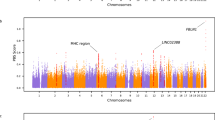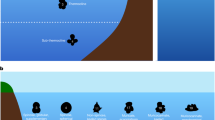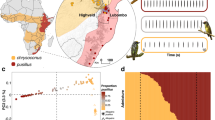Abstract
Understanding the capacity of species to acclimate and adapt to expected temperature increases is critical for making predictions about the biological impacts of global warming, yet it is one of the least certain aspects of climate change science1,2,3,4. Tropical species are considered to be especially sensitive to climate change because they live close to their thermal maximum and exhibit limited capacity for acclimation5,6,7. Here, we demonstrate that a tropical reef fish is highly sensitive to small increases in water temperature, but can rapidly acclimate over multiple generations. Acute exposure to elevated temperatures (+1.5 °C and +3.0 °C) predicted to occur this century caused a 15% and 30% respective decrease in individual’s maximum ability to perform aerobic activities such as swimming or foraging, known as aerobic scope. However, complete compensation in aerobic scope occurred when both parents and offspring were reared throughout their lives at elevated temperature. Such acclimation could reduce the impact of warming temperatures and allow populations to persist across their current range. This study reveals the importance of transgenerational acclimation as a mechanism for coping with rapid climate change and highlights that single generation studies risk underestimating the potential of species to cope.
This is a preview of subscription content, access via your institution
Access options
Subscribe to this journal
Receive 12 print issues and online access
$209.00 per year
only $17.42 per issue
Buy this article
- Purchase on Springer Link
- Instant access to full article PDF
Prices may be subject to local taxes which are calculated during checkout

Similar content being viewed by others
References
Hughes, T. P. et al. Climate change, human impacts, and the resilience of coral reefs. Science 301, 929–933 (2003).
Bradshaw, W. E. & Holzapfel, C. M. Evolutionary response to rapid climate change. Science 312, 1477–1478 (2006).
Munday, P. L., Jones, G. P., Pratchett, M. S. & Williams, A. J. Climate change and the future for coral reef fishes. Fish Fish. 9, 261–285 (2008).
Hofmann, G. E. & Todgham, A. E. Living in the now: Physiological mechanisms to tolerate a rapidly changing environment. Annu. Rev. Physiol. 72, 127–145 (2010).
Stillman, J. H. Acclimation capacity underlies the susceptibility to climate change. Science 301, 65 (2003).
Wright, S. J., Muller-Landau, H. C. & Schipper, J. The future of tropical species on warmer planet. Conserv. Biol. 23, 1418–1426 (2009).
Tewksbury, J. J., Huey, R. B. & Deutsch, C. A. Putting heat on tropical animals. Science 320, 1296–1297 (2008).
Poloczanska, E. S. et al. Climate change and Australian marine life. Oceanogr. Mar. Biol. Annu. Rev. 45, 407–478 (2007).
Munday, P. L. et al. Climate change and coral reef connectivity. Coral Reefs 28, 379–395 (2009).
Elaison, E. J. et al. Differences in thermal tolerance among sockeye salmon populations. Science 332, 109–112 (2011).
Angilletta, M. J. Jr Thermal Adaptation: A Theoretical and Empirical Synthesis (Oxford Univ. Press, 2009).
Mousseau, T. A. & Fox, C. W. The adaptive significance of maternal effects. Trends Ecol. Evol. 13, 403–407 (1998).
Rossiter, M. Incidence and consequence of inherited environmental effects. Annu. Rev. Ecol. Syst. 27, 451–476 (1996).
Lucassen, M., Koschnick, N., Eckerle, L. G. & Pörtner, H. O. Mitochondrial mechanisms of cold adaptation in cod (Gadus morhua L.) populations from different climatic zones. J. Exp. Biol. 209, 2462–2471 (2006).
Pörtner, H. O. & Knust, R. Climate change affects marine fishes through the oxygen limitation of thermal tolerance. Science 315, 95–97 (2007).
Pörtner, H. O. & Farrell, A. P. Physiology and climate change. Science 322, 690–692 (2008).
Skelly, D. K. et al. Evolutionary responses to climate change. Conserv. Biol. 21, 1353–1355 (2007).
Nilsson, G. E., Crawley, N., Lunde, I. G. & Munday, P. L. Elevated temperature reduces the respiratory scope of coral reef fishes. Glob. Change Biol. 15, 1405–1412 (2009).
Donelson, J. M., Munday, P. L., McCormick, M. I. & Nilsson, G. E. Acclimation to predicted ocean warming through developmental plasticity in a tropical reef fish. Glob. Change Biol. 17, 1712–1719 (2011).
Perry, S. F. & Gilmour, K. M. in Respiratory Physiology of Vertebrates: Life without Oxygen (ed. Nilsson, G. E.) 49–94 (Cambridge Univ. Press, 2010).
Guderley, H. & Johnston, I. A. Plasticity of fish muscle mitochondria with thermal acclimation. J. Exp. Biol. 199, 1311–1317 (1996).
Klaiman, J. M., Fenna, A. J., Shiels, H. A., Macris, J. & Gillis, T. E. Cardiac remodelling in fish: Strategies to maintain heart function during temperature change. PLoS ONE 6, e24464 (2011).
Huey, R. B. & Stevenson, R. D. Integrating thermal physiology and ecology or ectotherms: A discussion of approaches. Am. Zool. 19, 357–366 (1979).
Guderley, H., Leroy, P. H. & Gagné, A. Thermal acclimation, growth, and burst swimming of threespine stickleback: Enzymatic correlates and influence of photoperiod. Physiol. Biochem. Zool. 74, 66–74 (2001).
Tyler, C. R. & Sumpter, J. P. Oocyte growth and development in teleosts. Rev. Fish Biol. Fish. 6, 287–318 (1996).
Brooks, S., Tyler, C. R. & Sumpter, J. P. Egg quality in fish: What makes a good egg? Rev. Fish Biol. Fish. 7, 387–416 (1997).
Chellappa, S., Huntingford, F. A., Strang, R. H. C. & Thomson, R. Y. Condition factor and hepatosomatic index as estimates of energy status in male three-spined stickleback. J. Fish Biol. 47, 775–787 (1995).
Matty, A. J. Fish Endocrinology (Timber Press, 1985).
Jablonka, E. & Raz, G. Transgenerational epigenetic inheritance: Prevalence, mechanisms and implications for the study of heredity and evolution. Q. Rev. Biol. 84, 131–176 (2009).
Bonduriansky, R. & Day, T. Non-genetic inheritance and its evolutionary implications. Annu. Rev. Ecol. Evol. Syst. 40, 103–125 (2009).
Reed, D. H. & Frankham, R. Correlation between fitness and genetic diversity. Conserv. Biol. 17, 230–237 (2003).
Leuzinger, S. et al. Do global change experiments overestimate impacts on terrestrial ecosystems? Trends Ecol. Evol. 26, 236–241 (2011).
Acknowledgements
This study was supported by the ARC Centre of Excellence for Coral Reef Studies (P.L.M. and M.I.M.), the CSIRO Climate Adaptation Flagship (J.M.D.), the Australian Coral Reef Society (J.M.D.) and the GBRMPA Science for Management Awards (J.M.D.). Thanks to staff at JCU Research Aquarium Facility for logistical support. This project was completed under JCU Ethics A1233 and A1415.
Author information
Authors and Affiliations
Contributions
J.M.D., P.L.M. and M.I.M. designed the experiments. J.M.D. performed all the experiments and analysed the raw data. J.M.D., P.L.M., M.I.M. and C.R.P. wrote the paper. All authors provided intellectual input, read and approved the manuscript.
Corresponding author
Ethics declarations
Competing interests
The authors declare no competing financial interests.
Supplementary information
Rights and permissions
About this article
Cite this article
Donelson, J., Munday, P., McCormick, M. et al. Rapid transgenerational acclimation of a tropical reef fish to climate change. Nature Clim Change 2, 30–32 (2012). https://doi.org/10.1038/nclimate1323
Received:
Accepted:
Published:
Issue Date:
DOI: https://doi.org/10.1038/nclimate1323
This article is cited by
-
Evidence base for non-genetic inheritance of environmental exposures in non-human animals and plants: a map of evidence syntheses with bibliometric analysis
Environmental Evidence (2023)
-
Transgenerational effects influence acclimation to varying temperatures in Aurelia aurita polyps (Cnidaria: Scyphozoa)
Hydrobiologia (2023)
-
Paternal hypoxia exposure primes offspring for increased hypoxia resistance
BMC Biology (2022)
-
Microbiota mediated plasticity promotes thermal adaptation in the sea anemone Nematostella vectensis
Nature Communications (2022)
-
A prenatal acoustic signal of heat affects thermoregulation capacities at adulthood in an arid-adapted bird
Scientific Reports (2022)



